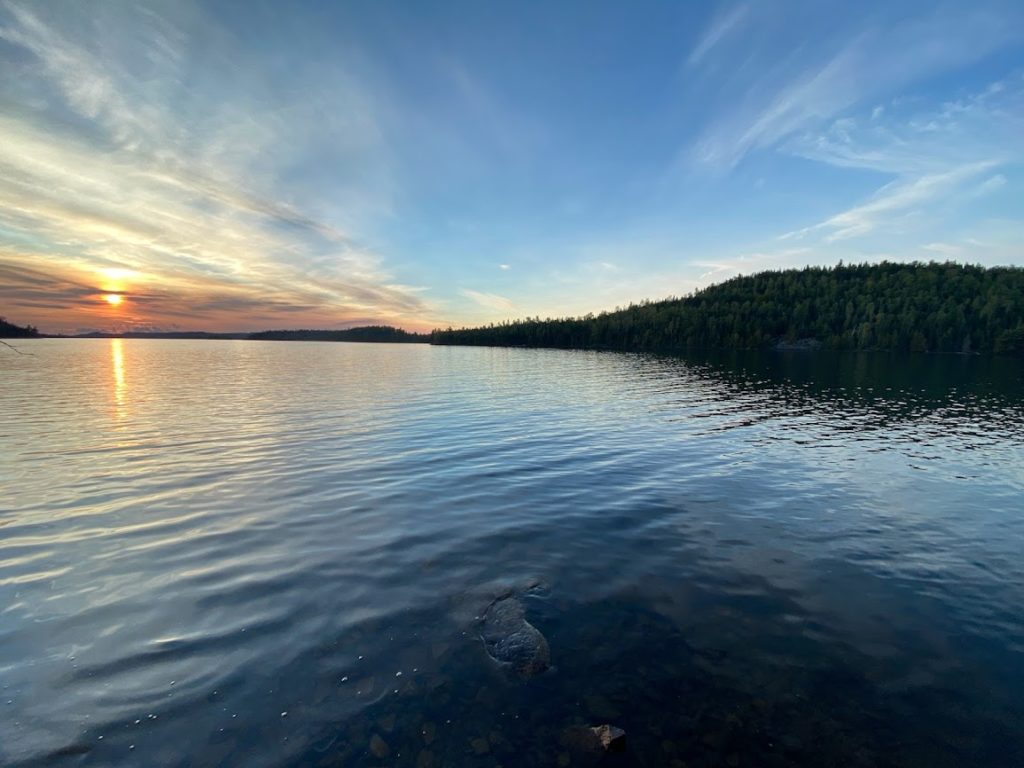
Matt Doll, Minnesota Environmental Partnership
Over the past month, thousands of visitors have been canoeing, backpacking, and portaging their way through Minnesota’s signature wilderness, the Boundary Waters Canoe Area Wilderness. Between setting up camp and picking wild blueberries, many might stop to think about the value of this natural haven. And they might also consider what could happen if industry begins treating the Boundary Waters watershed as expendable.
The Boundary Waters is one of North America’s most pristine water resources, as well as one of its most vulnerable. The rivers and lakes that make up the area are highly interconnected, forming much of its natural beauty and ecological value. That, along with a long tradition of canoeing and fishing, makes the Boundary Waters a vital part of Minnesota’s recreation economy, and has helped justify the area’s special protections.
MEP holds the position that all watersheds of Minnesota deserve full protection, from the Red to the St. Louis, from the Rainy to the Des Moines. As the place where the Laurentian and St. Lawrence continental divides meet, we’re upstream from half a continent. Everything we do flows outward – witness this year’s Gulf of Mexico “dead zone” to see how local agricultural pollution and other sources of nutrients can harm those far beyond our borders.
We hope to see stronger protections for all of these watersheds, but the fact that so much national momentum is in favor of special protection for the Boundary Waters is an encouraging sign. Minnesota Representative Betty McCollum has introduced HR 2794, the Boundary Waters Wilderness Protection and Pollution Prevention Act. This bill would address the pressing threat to our northern waters – sulfide-ore copper mining – by banning it within the watershed of the Boundary Waters and Voyageurs National Park.
As we’ve written time and again, sulfide-ore mining is a bad idea for Northern Minnesota due to its tendency to leak toxic acid into the waters around it, ruining entire ecosystems. No such mine has ever operated in the United States without heavily polluting the surrounding environment. Backers of projects like Twin Metals and PolyMet claim that new technology can prevent these issues, but this technology hasn’t been proven to work, and by the companies’ own admission, years, decades or centuries of maintenance are required to prevent pollution even after these types of mines close.
Currently, Twin Metals – the most high-profile example of a sulfide mining project in the Boundary Waters watershed – is looking like a long shot to ever be built. The Biden Administration reinitiated a mineral withdrawal to prevent extraction in the area and canceled two of Twin Metals’ federal leases. The state DNR has halted the permitting process for the mine in light of those actions. And while Twin Metals is suing to reinstate the leases – and hopes, perhaps, that a future administration would be more favorable – the project has been fully stopped in its tracks for now.
But while sulfide mining companies may lack concern for the long-term effects of their mines on watersheds, they think in the long-term as far as permitting goes. A future Presidential administration could reinstate Twin Metals’ leases, as the Trump Administration did several years ago. While state and federal agencies are bound to follow the law and the science, the interpretation of that law can vary widely, and courts aren’t guaranteed to find in favor of those who care about water, climate, and wildlife.
That’s why permanent efforts like HR 2794 are so important. Natural treasures like the Boundary Waters need unambiguous, permanent protections. As water resources and ecosystems are threatened by climate change, we can’t afford to lose any more to pollution. And Minnesota’s massive recreation economy would suffer heavily if our northern waters are treated as expendable – their appeal to outdoors lovers, after all, is in their protection from harm.
We hope to see HR 2794 continue to advance in the House and gain sponsorship and support in the Senate. If passed, this bill would be a lifeline for the Boundary Waters and Voyageurs and could help pave the way for broader measures to save Minnesota’s watersheds.
For previous columns, visit mepartnership.org/category/blog/. If you would like to reblog or republish this column, you may do so for free – simply contact the author at matthew@mepartnership.org.